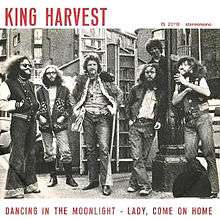Dancing in the Moonlight
| "Dancing in the Moonlight" | |
|---|---|
 | |
| Single by King Harvest | |
| from the album Dancing in the Moonlight | |
| B-side | "Lady, Come On Home" |
| Released | July 9, 1972 |
| Recorded | 1972 |
| Genre | Pop rock |
| Length | 2:57 |
| Label | Perception (P-515) |
| Songwriter(s) | Sherman Kelly |
| Producer(s) | Dave Robinson |
"Dancing in the Moonlight" is a song by the French-American rock group King Harvest that was released as a single in 1972 and reached number 13 on the Billboard Hot 100. The band released other singles, but they were never able to match the success of "Dancing in the Moonlight". The track used a Wurlitzer electric piano throughout. Decades after its original release, a cover by Toploader became a Platinum hit, selling over 600,000 copies.
History
The song was written in 1968 by Sherman Kelly,[1][2] whose brother, Wells Kelly – King Harvest's drummer – introduced the song to the band. It was originally recorded in 1969 by the American band Boffalongo, which included Sherman Kelly (singing lead on the original recording of his own composition)[3] and future King Harvest frontman Doc Robinson. Wells Kelly later became the original drummer for Orleans. Meanwhile, King Harvest recorded and released "Dancing in the Moonlight" as a single with "Lady, Come On Home" on the B-side while the band was based in Paris. Steve Cutler, a jazz drummer from New York City (standing on the base of the pole in the cover picture), played drums on the tracks and toured with the band in France and the UK. The group disbanded after six months and the single languished for a year, until it was bought and released worldwide by Perception Records.
The song was also recorded by High Broom and released in 1970 on Island Records (catalog no. WIP 6088; vinyl 7").[4][5] It failed to reach the UK Singles Chart.
A cover version was released in the UK in 1973 by the singing and dancing act Young Generation, but despite airplay, it failed to chart. The song finally charted in the UK in March 2000, after being covered in 1999 by Toploader, which used the first part of the first verse instead of the second part of the first verse. In 1994, the song was released as a single by the group Baha Men, but failed to chart. Their version was later used in the Fat Albert movie.
In Canada, the song made number 5 in the weekly charts and number 71 in the year-end chart for 1973.[6]
Charts
Weekly chartsToploader version
In 2000, English alternative rock band Toploader released a cover of "Dancing in the Moonlight". It was originally released in February 2000 as the third single from their debut studio album Onka's Big Moka (1999) and peaked at number 19 on the UK Singles Chart. It was re-released in November of the same year and then reached number 7. The song has been certified Platinum by the British Phonographic Industry for sales of over 600,000 copies. Critical receptionIn 2007, the song was placed at number 17 on BBC Three's list of "The 100 Most Annoying Pop Songs...We Hate to Love". Track listingUK CD single reissue
ChartsWeekly charts
Year-end charts
Certifications
Other versions
References
| ||||||||||||||||||||||||||||||||||||||||||||||||||||||||||||||||||||||||||||||||||||
